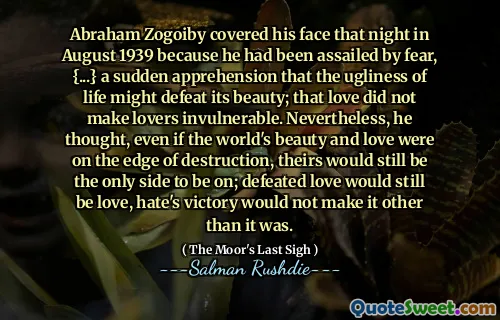"The Moor's Last Sigh," a novel by Salman Rushdie, intertwines history, culture, and the complexities of identity through the life of Moraes Zogoiby. Born into a wealthy, mixed-race family in India, his narrative explores the intricacies of his lineage and the vibrant yet tumultuous backdrop of Indian society. The story reflects on themes such as colonialism, heritage, and the impact of socio-political turbulence on personal lives.
The novel takes readers on a journey across generations, as Moraes recounts the rise and fall of his family's spice trade empire and the mysterious circumstances surrounding his parents. The characters are richly developed, showcasing a blend of myth and reality, allowing readers to experience the depth of their motivations and conflicts. This aspect is emphasized through the surreal and magical elements that Rushdie masterfully weaves into the narrative.
Ultimately, "The Moor's Last Sigh" is a meditation on the intersection of personal and historical narratives. It invites readers to consider the legacy of the past and its lasting influence on identity. Through Moraes's eyes, Rushdie presents a world that is both uniquely Indian and universally human, exploring the collisions of love, art, and politics that shape our perceptions of belonging and heritage.
More »
Today Birthdays
1729 -
Edmund Burke
1949 -
Haruki Murakami
1954 -
Howard Stern
1876 -
Jack London
1993 -
Zayn Malik
1951 -
Kirstie Alley
1863 -
Swami Vivekananda
1923 -
Alice Miller
1987 -
Naya Rivera
1825 -
Brooke Foss Westcott
1944 -
Joe Frazier
1951 -
Rush Limbaugh
1964 -
Jeff Bezos
1978 -
Jeremy Camp
1628 -
Charles Perrault
1856 -
John Singer Sargent
1970 -
Kaja Foglio
1953 -
Rick Santelli
1986 -
Gemma Arterton
1968 -
Raf Simons
1958 -
Christiane Amanpour
1966 -
Olivier Martinez
1996 -
Ella Henderson
1917 -
Maharishi Mahesh Yogi
1949 -
Ottmar Hitzfeld
1928 -
Ruth Brown
1968 -
Heather Mills
1946 -
George Duke
1968 -
Rachael Harris
1923 -
Ira Hayes
